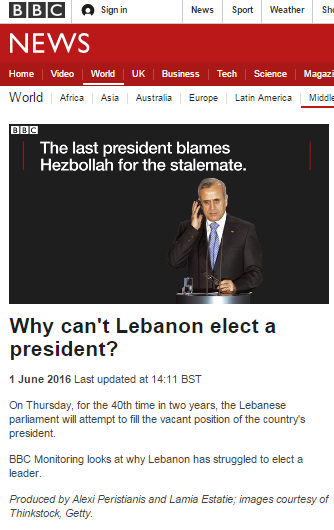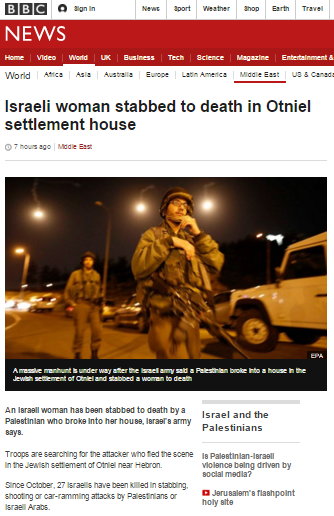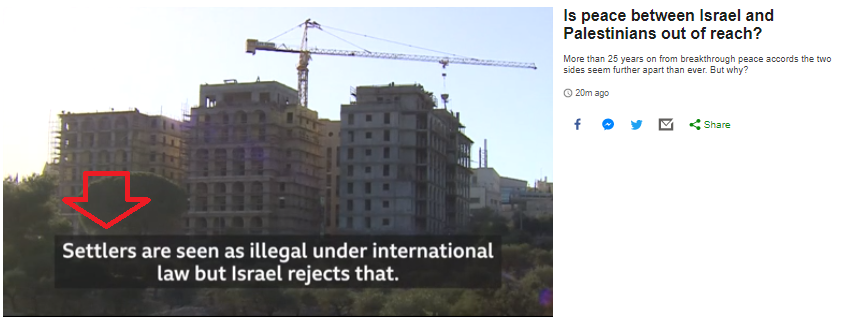Predictably, the BBC News website’s extensive coverage of the May 19th presidential election in Iran included copious portrayal of the winning candidate Hassan Rouhani as a “moderate” and a “reformer”.
“Iran presidential election: Five things to know“, Siavash Ardalan, 28/4/17
“…Iranian national politics is basically a power struggle between conservatives and reformists/moderates. […] Don’t forget that it was President Rouhani, a moderate, who was instrumental in helping strike an historic nuclear deal with world powers by convincing the supreme leader – considered closely associated with the conservative establishment – to reluctantly give his blessing.”
“The office of president and the executive branch can be reformist/moderate and has been for the past four years with Mr Rouhani at its helm.”
“Iran election: Could women decide the next president?“, Rana Rahimpour, 5/5/17
“Early on in the campaign the incumbent, President Hassan Rouhani, posted a photo of himself on social media which caused a flurry of comment.
He was out on a weekend walk in the mountains standing next to two young female hikers, both of whose hijab is far from what would be considered proper by the hardliners.
It was a clear message to young, modern female voters, that he was the candidate who was not overly bothered about the country’s restrictive dress code and other curbs on social freedom.
Mr Rouhani’s campaign video makes a point of praising Iranian women’s achievements in the worlds of both work and sport, and offering his support.
He is also the only candidate so far to have held a rally specifically for female voters.”
“Iran election: Hardliner Qalibaf withdraws candidacy“, 15/5/17
“Mr Qalibaf called on his supporters to back conservative cleric Ebrahim Raisi against the incumbent Hassan Rouhani, a moderate who is seeking a second term.”
“Iran election: Jahangiri withdraws and endorses Rouhani“, 16/5/17
“A reformist candidate in Iran’s presidential election has pulled out to smooth the path for the moderate incumbent, Hassan Rouhani.”
“Iran election: Votes are counted amid high turnout“, 20/5/17
“Mr Rouhani is a moderate cleric who negotiated a landmark nuclear deal with world powers in 2015.”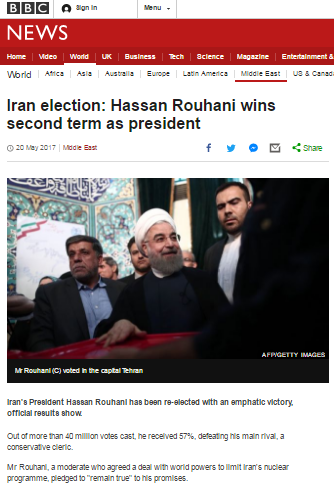
“Iran election: Hassan Rouhani wins second term as president“, 20/5/17
“Mr Rouhani, a moderate who agreed a deal with world powers to limit Iran’s nuclear programme, pledged to “remain true” to his promises.”
“…supporters of President Rouhani who back his promises to steer the country toward moderation came out in big numbers too. […] This was a revenge of the people against the hardliners who intimidated them, jailed them, executed them, drove them to exile, pushed them out of their jobs, and discriminated against women.
President Rouhani will now have a bigger mandate to push through his reforms, to put an end to extremism, to build bridges with the outside world, to put the economy back on track.”
“Iran election: Hassan Rouhani gets big mandate but will he deliver?“, Kasra Naji, 20/5/17
“Friday’s vote in Iran was the revenge of the moderates. A rejection of those who had intimidated them, jailed them, executed them, drove them to exile, pushed them out of their jobs.
In his campaign, President Rouhani promised to put an end to extremism, to open up the political atmosphere, to extend individual and political rights, to free political prisoners, to remove discrimination against women and bring under control all those state institutions that are not accountable. […]
He firmly placed himself in the camp of the reformists. Now, with his re-election, Iran is on the path towards change, with a renewed confidence drawn from the emphatic result.”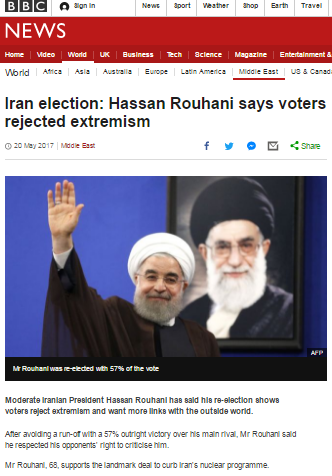
“Iran election: Hassan Rouhani says voters rejected extremism“, 20/5/17
“Moderate Iranian President Hassan Rouhani has said his re-election shows voters reject extremism and want more links with the outside world.”
“…supporters of President Rouhani who back his promises to steer the country toward moderation came out in big numbers too. […] This was a revenge of the people against the hardliners who intimidated them, jailed them, executed them, drove them to exile, pushed them out of their jobs, and discriminated against women.
President Rouhani will now have a bigger mandate to push through his reforms, to put an end to extremism, to build bridges with the outside world, to put the economy back on track.”
“Iran elections: Pro-Rouhani reformists in Tehran power sweep“, 21/5/17
“Iran’s re-elected moderate President Hassan Rouhani has received a further boost after reformists won key council elections in the capital, Tehran.”
BBC audiences are of course no strangers to that good cop/bad cop portrayal of Iranian politics. Ever since Rouhani was first elected in 2013, the corporation has been portraying him as a “moderate” and a “reformist”, while ignoring the fact that the United Nations Special Rapporteur on the situation of human rights in the Islamic Republic of Iran, Ahmed Shaheed, published a report in 2015 that found – among other things – that the number of executions in Iran has risen under Rouhani’s presidency. Last year Amnesty International reported similar findings.
Back in March the WSJ noted that Rouhani’s first term as president “hasn’t been moderate”:
“Witness the latest repression targeting the mullahs’ usual suspects. Tehran’s Prosecutor-General on Sunday announced it had sentenced a couple to death because they had founded a new “cult.” The announcement was short on details, but the charges could mean anything from running a New Age yoga studio to a political-discussion club.
The authorities have also detained Ehsan Mazandarani, a reporter with the reformist newspaper Etemad (“Trust”), according to the New York-based Committee to Protect Journalists. […]
Mr. Mazandarani’s detention followed last week’s arrest of dissident reporter Hengameh Shahidi, who also faces “national-security” charges. Ms. Shahidi has been an adviser to Mehdi Karroubi, one of two pro-democracy candidates in 2009’s fraudulent election. Mr. Karroubi and opposition leader Mir Hossein Mousavi have been under house arrest since 2011. Having hinted at freeing them during his campaign, Mr. Rouhani has kept mum on their cases since coming to office in 2013. […]
Historic Christian communities such as Assyrians and Armenians are afforded second-class protection under Iranian law, while apostasy by Muslims is punishable by death. Despite some early rhetoric about tolerance, Mr. Rouhani has been unwilling or unable to improve conditions for religious minorities.
There is also the status of some half a dozen U.S. and U.K. dual citizens who have been taken hostage by the regime while visiting Iran. These include father and son Baquer and Siamak Namazi, both U.S. citizens, and Nazenin Zaghari-Ratcliffe, a British citizen who is serving a five-year sentence on secret charges.”
At the Telegraph, Christopher Booker writes of:
“…the ghastly farce of the Iranian presidential election, when again we were told that the victor, Hassan Rouhani, was a “moderate” against a “hardliner”. As I have reported many times, Rouhani is an utterly ruthless operator, who had presided since 2013 over a collapsing economy and what Amnesty International called “a staggering execution spree”, murdering and imprisoning so many dissidents that Iran has per capita the highest execution rate in the world.”
At Bloomberg, Eli Lake notes that:
“During his campaign, he [Rouhani] told voters that he would be a “lawyer” defending their rights. He criticized his main rival, Ebrahim Raisi, for his role in ordering the executions of political dissidents. He promised gender equality and a freer press.
All of that sounds pretty good. And for those in the west looking for an Iranian version of Mikhail Gorbachev, it makes a nice talking point. Unfortunately, there is no reason to believe Rouhani will deliver, or even try to deliver, on any of these promises.
There are a few reasons for this. To start, Rouhani delivered the same line back in 2013 when he first won the presidency. We now know that human rights in Iran have further eroded during his tenure. A lot of this has been documented by the Center for Human Rights in Iran. The organization noted in October that Rouhani supported a law that would essentially place all Iranian media under government control. The center also documented a wave of arrests of journalists in November 2015, following Iran’s agreement to the nuclear bargain with the U.S and five other world powers. In the run-up to Friday’s vote, 29 members of the European Parliament wrote an open letter urging Iran to end its arrests, intimidation and harassment of journalists in the election season.”
And yet, the BBC continues to spoon-feed its audiences with simplistic framing of Rouhani as a benevolent “moderate” and “reformer”. One would of course expect that a media organisation obliged to provide its funding public with accurate and impartial information with the aim of enhancing their “understanding of international issues” could do considerably better.
Related Articles:
Why does the BBC continue to describe Rouhani as a ‘moderate’?
BBC framing of Iran’s president once again shown to be redundant
BBC does Iranian ‘moderates and reformists’ framing yet again

